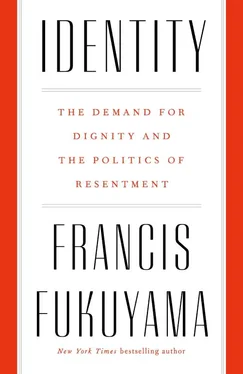The problem with megalothymia is that for every person recognized as superior, far more people are seen as inferior and do not receive any public recognition of their human worth. While Socrates and Adeimantus associate thymos primarily with the class of guardians, they also seem to think that all human beings possess all three parts of the soul. Nonguardians have their pride as well, a pride that is injured when the nobleman slaps them in the face and orders them out of the way, or when a daughter or a wife is taken involuntarily as sexual plaything by her social “betters.” While a certain group of humans always want to be seen as superior, a powerful feeling of resentment arises when one is disrespected. Moreover, while we are willing to laud people with certain kinds of achievement, such as the great athlete or musician, many social honors are rooted not in true superiority, but rather in social convention. We can easily resent people who are recognized for the wrong things, such as exhibitionist socialites or reality-show stars who are no better than us.
So an equally powerful human drive is to be seen as “just as good” as everyone else, something we may label “isothymia.” {6} 6 For an account of how isothymia plays out in practice, see Robert W. Fuller, Somebodies and Nobodies: Overcoming the Abuse of Rank (Gabriola Island, British Columbia: New Society Publishers, 2003).
Megalothymia is what economist Robert Frank labels a “positional good”—something that by its very nature cannot be shared because it is based on one’s position relative to someone else. {7} 7 Robert H. Frank, Choosing the Right Pond: Human Behavior and the Quest for Status (Oxford: Oxford University Press, 1985), 7.
The rise of modern democracy is the story of the displacement of megalothymia by isothymia: societies that only recognized an elite few were replaced by ones that recognized everyone as inherently equal. In Europe, societies stratified by class began to recognize the rights of ordinary people, and nations that had been submerged in great empires sought a separate and equal status. The great struggles in American political history—over slavery and segregation, workers’ rights, women’s equality—were ultimately demands that the political system expand the circle of individuals it recognized as having equal rights.
Yet the story is more complicated than that. Contemporary identity politics is driven by the quest for equal recognition by groups that have been marginalized by their societies. But that desire for equal recognition can easily slide over into a demand for recognition of the group’s superiority. This is a large part of the story of nationalism and national identity, as well as certain forms of extremist religious politics today.
A further problem with isothymia is that certain human activities will inevitably entail greater respect than others. To deny this is to deny the possibility of human excellences. I cannot play the piano and cannot pretend that I am the equal of Glenn Gould or Arthur Rubinstein in this regard. No community will fail to pay greater honor to the soldier or police officer who risks his or her life for the common good than to the coward who flees at the first sign of danger or, worse yet, betrays the community to outsiders. Recognition of everyone’s equal worth means a failure to recognize the worth of people who are actually superior in some sense.
Isothymia demands that we recognize the basic equal worth of our fellow human beings. In democratic societies we assert, with the American Declaration of Independence, that “all men are created equal.” Yet historically, we have disagreed on who qualifies as “all men.” At the time that the declaration was signed, this circle did not include white men without property, black slaves, indigenous Americans, or women. Moreover, since human beings are so obviously varied in their talents and capacities, we need to understand in what sense we are willing to recognize them as equal for political purposes. The Declaration of Independence says this is “self-evident,” without giving us much guidance on how we are to understand equality.
Thymos is the part of the soul that seeks recognition. In the Republic , only a narrow class of people sought recognition of their dignity, on the basis of their willingness to risk their lives as warriors. Yet the desire for recognition also seems to lie within every human soul. The shopkeepers or artisans or beggars on the street can also feel the pang of disrespect. But that feeling is inchoate, and they do not have a clear sense of why they should be respected. Their society is telling them that they are not worth as much as the aristocrat; why not accept society’s judgment? For much of human history, this was indeed the fate of the great mass of humanity.
But while thymos is a universal aspect of human nature that has always existed, the belief that each of us has an inner self that is worthy of respect, and that the surrounding society may be wrong in not recognizing it, is a more recent phenomenon. So while the concept of identity is rooted in thymos, it emerged only in modern times when it was combined with a notion of an inner and an outer self, and the radical view that the inner self was more valuable than the outer one. This was the product of both a shift in ideas about the self and the realities of societies that started to evolve rapidly under the pressures of economic and technological change.
Unlike thymos, which is a permanent part of human nature, what was to become the modern concept of identity emerged only as societies started to modernize a few hundred years ago. While it originated in Europe, it has subsequently spread and taken root in virtually all societies around the globe.
The foundations of identity were laid with the perception of a disjunction between one’s inside and one’s outside. Individuals come to believe that they have a true or authentic identity hiding within themselves that is somehow at odds with the role they are assigned by their surrounding society. The modern concept of identity places a supreme value on authenticity, on the validation of that inner being that is not being allowed to express itself. It is on the side of the inner and not the outer self. Oftentimes an individual may not understand who that inner self really is, but has only the vague feeling that he or she is being forced to live a lie. This can lead to an obsessive focus on the question “Who am I, really?” The search for an answer produces feelings of alienation and anxiety and can only be relieved when one accepts that inner self and receives public recognition for it. And if that outer society is going to properly recognize the inner self, one has to imagine society itself being able to change in fundamental ways.
In the West, the idea of identity was born, in a sense, during the Protestant Reformation, and it was given its initial expression by the Augustinian friar Martin Luther. Luther received a traditional theological education and a professorship at Wittenberg; for ten years, he read, thought, and struggled with his inner self. In the words of one historian, Luther “found himself in a state of despair before God. He wanted the assurance of being acceptable to God, but could discover in himself only the certainty of sin and in God only an inexorable justice which condemned to futility all his efforts at repentance and his search for the divine mercy.” {1} 1 G. R. Elton, Reformation Europe, 1517–1559 (New York: Harper Torchbooks, 1963), 2.
Luther sought the remedies of mortification recommended by the Catholic Church, before realizing that he could do nothing to bribe, cajole, or entreat God. He understood that the Church acted only on the outer person—through confession, penance, alms, worship of saints—none of which could make a difference because grace was bestowed only as a free act of love by God.
Читать дальше












